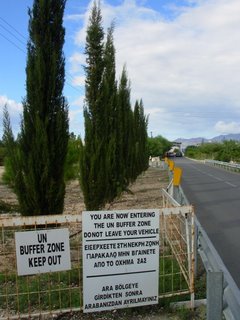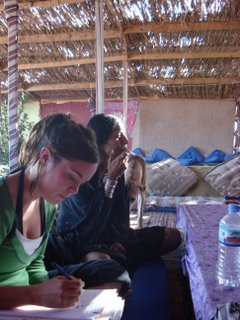The former Chilean dictator Augusto Pinochet died on December 10. Here's an interesting obituary from National Public Radio, USA.
Greg Palast writes here on Pinochet and Milton Friedman, who also died recently.
No online reference to Pinochet can be complete without the obituary from the D.C.-based National Security Archive. There are some interesting tidbits here about US responsibility for Chile's "regime change." Rome wasn't burned in a day, you know. It took classified assessments and memos first, and fastidious denials later.
12.10.2006
Fall Break in Cyprus

My friend Kavita's yawn became the stuff of postcard photography during this sunset in Agia Napa.

The ancient ruins of Apollo's Temple near Limassol. Cyprus also figures prominently in Greek mythology for being the place that Aphrodite emerged from the Sea.

Irish Car Bombing activity was reported at our table. Grimacing, I later decomissioned my glass.

A typical street in the old section of Nicosia at night.

The colors of streets were really wonderful in Cyprus. I liked the blue shutters I kept seeing, in this case in Larnaka.
Cyprus, the two governments and the EU


Here are a couple of photos of the UN Green Line between the "Turkish Republic of Northern Cyprus" and the Greek-oriented "Republic of Cyprus." Crossing today is quite easy and they will stamp you in and out on a separate sheet of paper to ease your travel in other places. We visited a tiny little Turkish town near Nicosia, not knowing really what we were going to see there. After about half an hour of curiosity seeking among government housing developments, and modest commercial buildings and a coffee shop, we shrugged and returned to the more tourist-oriented Greek side. When we returned to our rental car, we realized we had parked near cement machine-gun fortifications, grown over with plants. They call it Cyprus coffee in the south, but you can imagine that they definitely call the muddy, thick espresso Turkish in the north.
This website for the capital Nicosia not surprisingly pushes political buttons by pronouncing Nicosia "The Last Divided City in Europe." Other signs of competing political claims are preseneted to tourists like myself, from newspapers, billboards, brochures, roadsigns and even maps themselves, pointing out the areas that are "under foreign occupation." A juice bar owner in Agia Napa, in the south, said that there was "nothing" to see in the north. He said, "I don't know about you, but when someone comes to my country, I only want to tell them to see what there is to be proud about. Save your time and stay in the Free State." A Greek Cypriot friend of mine had a sister advised me not to spend any money in the north that would undercut "the boycott." On the other hand, a Turkish-American friend has told me that the Turkish Cypriots are the victims of colonialism in this standoff and the EU is just using the Cyprus issue to marginalize Turkey.
Having spent almost all of our time on one half of an island, even though we did not get much of the Greek narrative down, we heard almost nothing of the Turkish one. And as I began to see in the past while living in Northern Ireland, I have to imagine there is a spectrum between the hard line opinions with a more complicated and interesting history that could be the basis for a shared future in a unified power-sharing arrangement. Easy for me to say, I know. Regardless of our interest in human rights and politics, Christian, Hania, Kavita and I were just basically hanging out on the beach, driving around, occasionally taking pictures of pretty things.
12.09.2006
12.08.2006
Abdullahi An-Na'im on Shari'a Law
This week, Abdullahi An-Na'im came to AUC to deliver a few lectures. He points out some interesting possibilities in the political sphere for forwarding emancipatory religious and human rights agendas in the Muslim World. Far from being an advocate of a Bush/Rice vision for the Middle East (which could go unstated if only they'd stop invoking human rights), he criticizes both the imposed colonial discourse and the post-colonial Islamist discourse on these matters. Since I don't feel competent to sum up his work, I'll put a few links up.
Take a look at An-Na'im's project, The Future of Shari'a Law, and his own website at Emory University in Atlanta, USA, which features several downloads of his work.
An-Na'im left Sudan after his mentor, the Islamic reformer Mahmoud Mohamed Taha, was executed by the Sudanese government in 1985. You can read about the Republican Brothers and their interest in Shari'a reform, among other projects, in several places, including:
New Perspectives Quarterly
Alfikra - The Republican Thought
World Peoples' Blog
The Sudanese Thinker
Take a look at An-Na'im's project, The Future of Shari'a Law, and his own website at Emory University in Atlanta, USA, which features several downloads of his work.
An-Na'im left Sudan after his mentor, the Islamic reformer Mahmoud Mohamed Taha, was executed by the Sudanese government in 1985. You can read about the Republican Brothers and their interest in Shari'a reform, among other projects, in several places, including:
New Perspectives Quarterly
Alfikra - The Republican Thought
World Peoples' Blog
The Sudanese Thinker
The Field
I am coming up for air after some writing, some traveling and various projects. My decline in output is making the CR sponsors a little restless. So to calm them down, I decided to embark on some long-winded prose without hyper-links and explain how I am thinking of the relationship of human rights to the state.
I've been thinking about somehing along the lines of David Kennedy: what is not working in the "field" of human rights, whether "field" means practical limits to professionalism generally, or more abstractly, a zone of politics, critique, imagination, and emancipation. I like the concept of emancipation, no matter that the word seems haughty or fundamentally historic as in its American abolitionist movement sense. People like David Kennedy describe human rights as trying to occupy the political field and obscuring alternative approaches to emancipation, and I think this is a good thing to be concerned about.
Human rights discourse takes a hard look at particular state actions, but not state sovereignty and the continuing power of states to commit such abuses. On the contrary, human rights discourse depends on state institutions so that they will enter into the conventions, protocols and other contracts that set up justicability for human rights claims. This is a problem for several reasons, for example, most of the world's nation-states have their origins in a monopolization of legal uses of violence (and often speech, assembly and other personal freedoms) in the hands of an elite who barred what we now may consider human rights concepts, such as the right to life, self-determination, non-discrimination, and as described in the African Charter, the rights of peoples. While I accept that human rights law's origin in the state means that it has its origin in hegemony, I think human rights law presents some important opportunities for emancipation. New ideas about jurisprudence, admissibility, and of course, new legal norms themselves may be moving in the direction of wider support and capacity to reconfigure and localize formal aspects of the human rights movement. This is a good thing, in my view.
Yet in any close look at human rights, some chewy epistemological questions emerge. Who or what, other than the state, or the contracts agreed to by states in common, can stabilize rights, grant them, and maintain access to them? If we try to keep rights, but refuse their origins in the state, we assume that human dignity or some other human quality is the basis for an ethic of human treatment that has its origins prior to the state, leading us to particular ideas about religion or a supposedly self-evident humanist inkling akin to the Golden Rule. If indeed an origin for rights exists outside of the state, why do we find throughout world history so many variations in societal norms and roles? Do human rights step in when the state fails, or do states use the simple fact of their accession to human rights instruments to legitimize their abuses? States typically wager that enforcement of international law is weak and that challenges to state power from human rights instruments will only come in the form of negative limits, which can be gotten around with a little creativity or obfuscation. Resulting proposals to replace state citizenship with some new global citizenship replace the original questions about states and rights with new questions that may even be more problematic concerning soft regional power. What would global or regional citizenship even mean? I really cannot tell.
The idea in all of this for me is that somehow emancipation through legal means needs to be complemented by emancipation through political means, and likely proceeded by it. Maybe a critique of the state can be synonymous with legal reforms, and a legitimate juncture between the two will be easier to imagine in the future. For now, the sense of human rights as a new, contingent vision of power, challenging both the state and the political sphere even while it draws strength and attention from them, is interesting to me. I will still admit the following, and encourage others to do the same: that the attempts of human rights at emancipation seem outmatched and internally confused for the foreseeable future. But this does not need to dissuade us from working harder to reconcile different emancipatory strategies.
I've been thinking about somehing along the lines of David Kennedy: what is not working in the "field" of human rights, whether "field" means practical limits to professionalism generally, or more abstractly, a zone of politics, critique, imagination, and emancipation. I like the concept of emancipation, no matter that the word seems haughty or fundamentally historic as in its American abolitionist movement sense. People like David Kennedy describe human rights as trying to occupy the political field and obscuring alternative approaches to emancipation, and I think this is a good thing to be concerned about.
Human rights discourse takes a hard look at particular state actions, but not state sovereignty and the continuing power of states to commit such abuses. On the contrary, human rights discourse depends on state institutions so that they will enter into the conventions, protocols and other contracts that set up justicability for human rights claims. This is a problem for several reasons, for example, most of the world's nation-states have their origins in a monopolization of legal uses of violence (and often speech, assembly and other personal freedoms) in the hands of an elite who barred what we now may consider human rights concepts, such as the right to life, self-determination, non-discrimination, and as described in the African Charter, the rights of peoples. While I accept that human rights law's origin in the state means that it has its origin in hegemony, I think human rights law presents some important opportunities for emancipation. New ideas about jurisprudence, admissibility, and of course, new legal norms themselves may be moving in the direction of wider support and capacity to reconfigure and localize formal aspects of the human rights movement. This is a good thing, in my view.
Yet in any close look at human rights, some chewy epistemological questions emerge. Who or what, other than the state, or the contracts agreed to by states in common, can stabilize rights, grant them, and maintain access to them? If we try to keep rights, but refuse their origins in the state, we assume that human dignity or some other human quality is the basis for an ethic of human treatment that has its origins prior to the state, leading us to particular ideas about religion or a supposedly self-evident humanist inkling akin to the Golden Rule. If indeed an origin for rights exists outside of the state, why do we find throughout world history so many variations in societal norms and roles? Do human rights step in when the state fails, or do states use the simple fact of their accession to human rights instruments to legitimize their abuses? States typically wager that enforcement of international law is weak and that challenges to state power from human rights instruments will only come in the form of negative limits, which can be gotten around with a little creativity or obfuscation. Resulting proposals to replace state citizenship with some new global citizenship replace the original questions about states and rights with new questions that may even be more problematic concerning soft regional power. What would global or regional citizenship even mean? I really cannot tell.
The idea in all of this for me is that somehow emancipation through legal means needs to be complemented by emancipation through political means, and likely proceeded by it. Maybe a critique of the state can be synonymous with legal reforms, and a legitimate juncture between the two will be easier to imagine in the future. For now, the sense of human rights as a new, contingent vision of power, challenging both the state and the political sphere even while it draws strength and attention from them, is interesting to me. I will still admit the following, and encourage others to do the same: that the attempts of human rights at emancipation seem outmatched and internally confused for the foreseeable future. But this does not need to dissuade us from working harder to reconcile different emancipatory strategies.
Subscribe to:
Comments (Atom)






